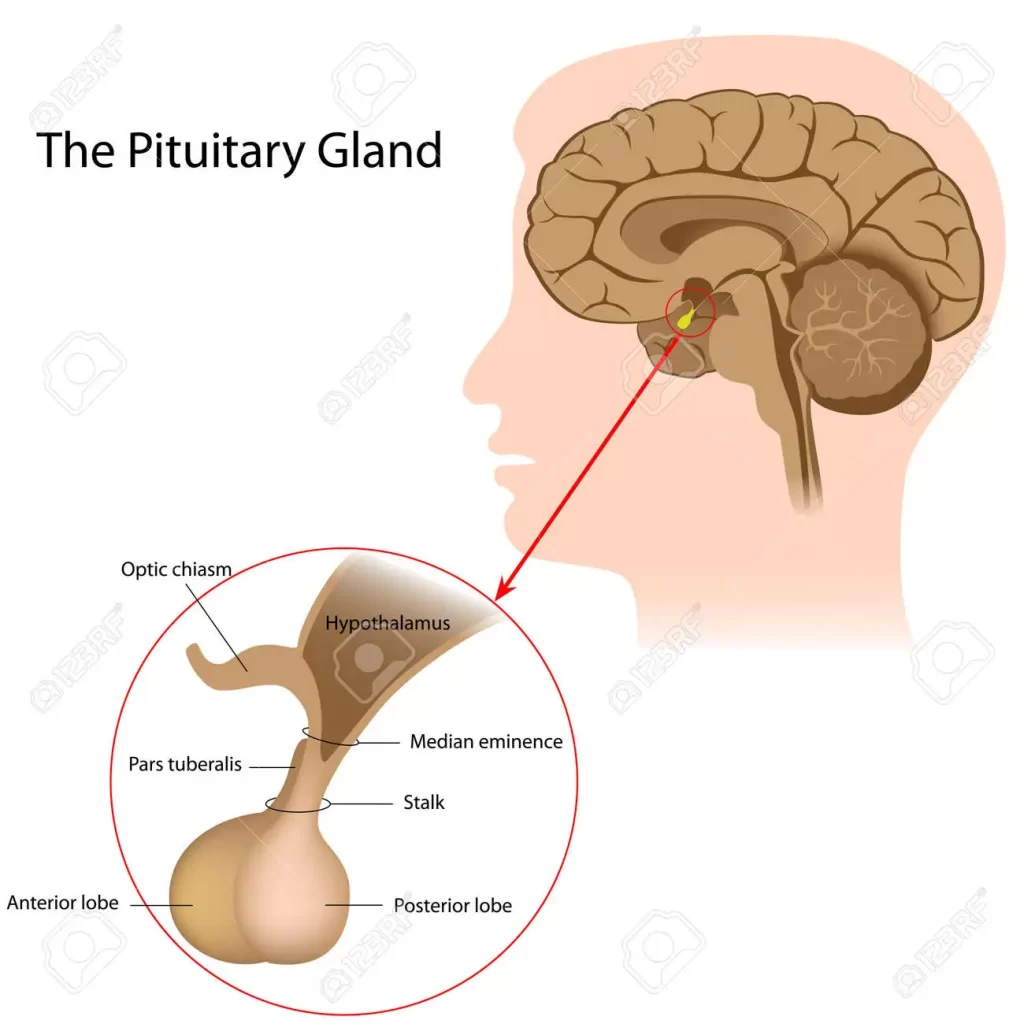
The pituitary gland is an essential ductless endocrine gland in the body. Therefore, the hormones of the pituitary gland are secreted directly into the blood. Pituitary Gland acts on the thyroid gland to produces thyroid hormones.
It weighs less than one gram in a healthy adult. It is similar to a pea or kidney bean, about 500 to 900mg. However, it is regarded as the master gland in the body because its hormones control the functioning of other endocrine glands.
To maintain the wholesome well-being of the body, the hormones produced by the pituitary gland act on the thyroid, reproductive organs, adrenal gland, and other body organs like kidneys.
How does the pituitary gland affect my thyroid gland?
The pituitary gland acts on the thyroid gland to produce thyroid hormones. It makes a substance called thyrotropin. It regulates thyroid hormone production by the negative feedback mechanism.
A negative feedback mechanism means that if there is too much thyroid hormone in the blood, the pituitary gland stops producing thyrotropin to slow metabolism. Also, suppose there is too little thyroid hormone in the blood. In that case, the pituitary gland increases the production of thyrotropin to increase metabolism.
Furthermore, the thyroid gland is vital for maintaining physical and mental activity. The thyroid gland is inactive without stimulation from the pituitary gland.
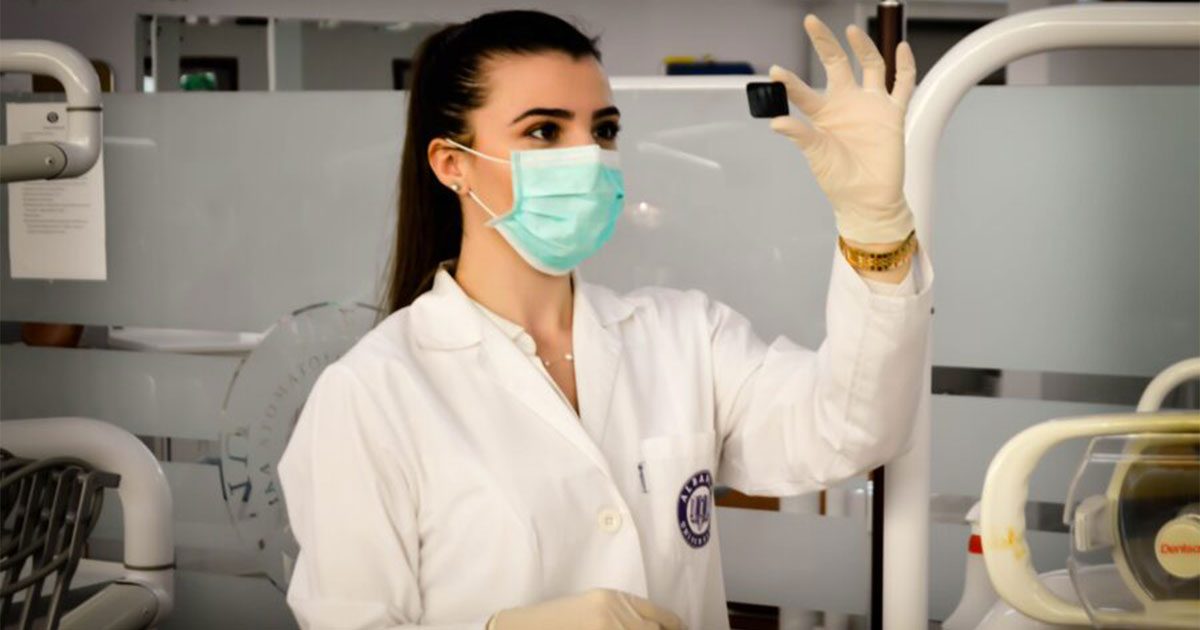
Where is the pituitary gland located?
A bony structure called the sella turcica, found at the base of the brain, encloses the pituitary gland. The hypothalamus connects with the pituitary gland via the pituitary stalk. The pituitary stalk comprises blood vessels called the hypophyseal portal veins and nerve structures such as neuronal axons.
What are the hormones of the pituitary gland?
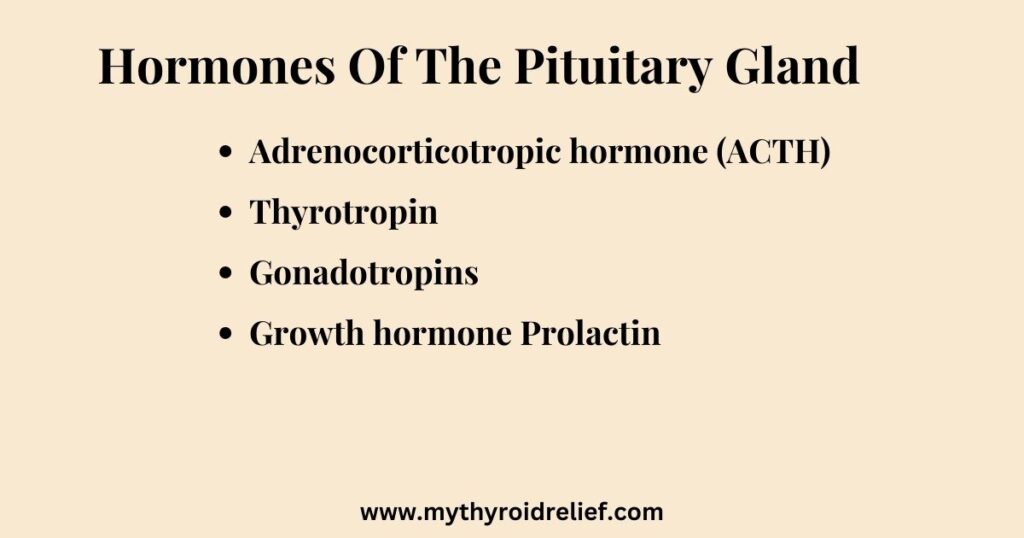
The pituitary secretes two sets of hormones. The anterior lobe secretes the first set of hormones, while the posterior lobe secretes the second. Let us take a look at these hormones individually; he anterior lobe produces and secretes six different hormones
-
Adrenocorticotropic hormone (ACTH)
ACTH is responsible for the production of cortisol and androgenic hormones by the cortex of the adrenal gland. Cortisol is known as the stress hormone. It regulates the response of the body to stress by managing blood pressure, blood sugar, body metabolism, and fat.
-
Thyrotropin
Thyrotropin regulates the production of T3 and T4 from the thyroid gland. Thyroid hormones are also one of the body’s significant hormones, as they control the body’s metabolism, energy levels, and nervous system. The deficiency of thyroid hormones makes it difficult for the individual to carry out regular daily activities.
-
Gonadotropins
The anterior pituitary synthesizes two gonadotropin hormones. Follicle-stimulating hormone (FSH) and Luteinizing hormone (LH) are very similar. Both hormones act on the ovaries in women and the testes in men.
FSH and LH increase fertility by stimulating the ovaries and testes to produce estrogen and testosterone. Another action of LH is stimulating the ovaries to produce progesterone, which is also very important in promoting fertility in women.
-
Growth hormone
GH is a vital hormone, especially during childhood and puberty. It acts on the bones, fat tissues, muscle tissues, and other soft tissues. Growth hormone is responsible for linear growth in childhood development of secondary sexual characteristics during puberty. It also regulates the mobilization of fat and glucose uptake by cells.
-
Prolactin
Prolactin is an essential hormone for milk production for newborns. It acts on the breast’s mammary gland to stimulate breast milk production. Also, a decrease in the production of prolactin in lactant women causes a reduction in milk production. Men also have some prolactin secreted; it helps to promote fertility and sexual function. However, overproduction of prolactin in men leads to enlarged breasts, low sex drive, and impotence.
The posterior lobe
The posterior lobe secretes two hormones:
Vasopressin
Vasopressin is synthesized by the hypothalamus and stored in the posterior pituitary. It maintains water and electrolyte balance in the body. The kidney’s proximal renal tubules maintain water and electrolyte homeostasis through water conservation.
Overproduction of vasopressin in the body causes SIADH. SIADH is known as a syndrome of inappropriate antidiuretic hormone secretion. It causes the body to retain too much water. In comparison, the underproduction of vasopressin causes diabetes insipidus, which causes excess urination and further dehydration.
It causes the body to retain too much water. In comparison, the underproduction of vasopressin causes diabetes insipidus, which causes excess urination and further dehydration.

Oxytocin
Oxytocin is secreted in the posterior pituitary, with lesser amounts produced in men than in women. Although synthesized throughout life, it is majorly active during the late stages of pregnancy and labor. Just like ADH, it is synthesized by the hypothalamus and stored in the pituitary gland for secretion.
The action site for oxytocin is the uterus and mammary glands. Oxytocin stimulates the uterus muscles during labor to expel the baby from the uterus. This hormone is also responsible for the cessation of menses in pregnant women.
Another primary function of oxytocin is milk ejection from nursing mothers. Oxytocin stimulates the mammary glands of the breast to eject milk when the baby suckles.
Overproduction of oxytocin causes benign prostatic hyperplasia (an enlargement of the prostate gland) in men and breast milk leakage in women.
Meanwhile, oxytocin deficiency causes a broad array of neuropsychiatric functions. It may be essential in multiple psychiatric disorders, such as autism, schizophrenia, and mood and anxiety disorders.
The Function of the Pituitary Gland Hormones
The pituitary gland plays an essential role in endocrine function. Yet, the part of the pituitary gland is dependent on the hypothalamus. Generally, the functions of the pituitary gland are:
- Growth
- Reproduction, including childbirth and labor
- Lactation
- Metabolism
- Response to stress
- Water and electrolyte balance
- Thyrotropin regulates the production of thyroid hormones from the thyroid. The thyrotropin-releasing hormone regulates the production of thyrotropin.
- Adrenocorticotropic hormones (ACTH) regulate the adrenal cortex’s production of cortisol and androgenic hormones. The corticotropin-releasing hormone regulates the production of ACTH.
- Follicle-stimulating hormone (FSH) stimulates the production of estrogens and the growth of eggs in the ovaries. Also, it stimulates the production of testosterone in the testes. The gonadotropin-releasing hormone regulates the production of FSH.
- Luteinizing hormone (LH) stimulates ovulation by producing estrogens and progesterone. LH also boosts testosterone production. The gonadotropin-releasing hormone regulates the production of LH.
- Growth hormones stimulate linear growth in children. Growth hormone-releasing hormone regulates the production of growth hormone.
- Prolactin stimulates milk production for neonates.
The hypothalamus synthesizes antidiuretic hormone (ADH) and oxytocin. These hormones are stored and secreted by the posterior lobe of the pituitary gland.
- Oxytocin is a vital hormone during labor and childbirth. It stimulates the contraction of the muscles of the uterus. Also, oxytocin acts directly on the mammary glands of the breasts to facilitate milk ejection. Suckling of the breast by the infant also stimulates milk ejection.
- Vasopressin, also known as ADH, regulates blood pressure. ADH also maintains the water and electrolyte balance in the body. The renal tubules perform the function of water and electrolyte balance.
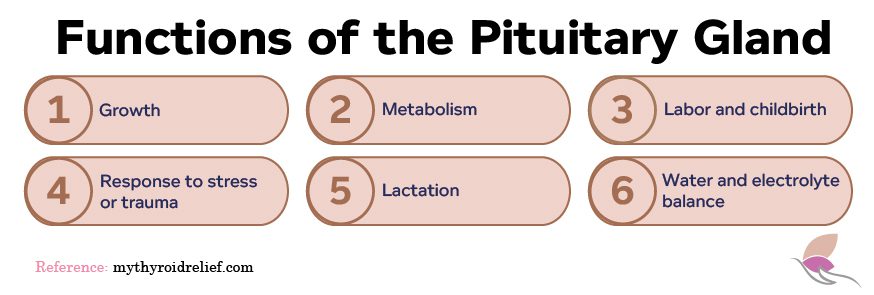
What happens when the pituitary gland doesn’t function properly?
Pituitary gland disorders cause adverse effects on the well-being of individuals. There are three significant categories of pituitary gland disorders. They are:
-
Overproduction of one or more hormones of the pituitary gland
Excess making of pituitary gland hormones is called hyperpituitarism. Tumors of this gland are the significant causes of too much hormone production.
Cushing’s syndrome and Acromegaly are common disorders caused by excess pituitary hormones. These disorders are significantly induced by tumors of the corticotrophs and somatotrophs, respectively. Other conditions are secondary hyperthyroidism and prolactinoma.
Furthermore, excessive thyrotropin causes secondary hyperthyroidism. Too much corticotropin causes Cushing’s syndrome. Growth hormone in excess is responsible for Acromegaly. Prolactin overproduction causes breast enlargement in men and low libido.
-
The underproduction of one or more hormones of the pituitary gland and its effect.
This disorder is known as hypopituitarism. It is a very acute disorder and can be life-threatening if not carefully managed.
Causes of low pituitary gland hormones are tumors, infections, reduced supply of blood to the gland, and some autoimmune diseases.
In addition, the underproduction of thyrotropin causes hypothyroidism. Corticotropin deficiency causes depression and anorexia, among many others. Growth hormone deficiency causes dwarfism, and prolactin deficiency causes hypoprolactinemia.
-
Alteration of the size or shape of the pituitary gland.
An example of this pituitary gland disorder is the Empty Sella Syndrome. The empty sella syndrome is a defect involving the sella turcica. The sella turcica is the bony framework that houses and protects the pituitary gland.
There are two types of empty sella syndrome; primary empty sella syndrome and secondary empty sella
Furthermore, ESS is not a life-threatening condition. Treatments for empty sella syndrome are available and safe. Surgeries and effective medications for empty sella syndrome are highly employable. Apart from the above-listed pituitary gland disorders, there is a condition that affects the health of the pituitary gland.
-
Pituitary adenoma
Pituitary adenomas are benign, non-cancerous tumors that do not spread outside the skull. These tumors cause an imbalance of pituitary hormones. In most cases, they result in the overproduction of pituitary hormones that affect the body’s normal functioning.
When the tumors grow on the pituitary gland or close to it, it can cause hormonal imbalance. It can also press against the optic nerves or brain tissue, causing vision impairment and headaches. There are two types of tumors of the pituitary gland.
-
Secretory tumors.
These tumors interfere with the production of pituitary hormones. Meanwhile, they cause either overproduction or underproduction of hormones, causing an imbalance in the body.
-
Non-secretory tumors
These tumors do not secrete hormones. Instead, they grow too large and press on other brain structures, causing vision loss and headaches.
Other causes of pituitary gland disorders are
- Head injury or trauma
- Surgeries
- Bleeding in or around the pituitary gland
- Medications
- Chemotherapy
- Genetics
If you have a family history of pituitary gland disorders, you are more likely to have one. However, not all pituitary gland disorders are heritable.
What are the symptoms of pituitary gland disorders?
Pituitary gland disorders exist across a broad spectrum, as listed above. Symptoms of hypopituitarism and hyperpituitarism manifest with symptoms of a lack of hormones produced by the gland. Symptoms can be mild at the beginning and gradually worsen over time. Still, in some cases, they tend to appear suddenly.
Panhypopituitarism is when symptoms of deficiency of all hormones of the pituitary gland are absent at the same time.
Growth Hormone
A deficiency of growth hormones leads to the arrest of growth in children. In adults, it can manifest as the following:
- Body weakness and fatigue
- Apathy
- Reduce exercise ability
- Bone weakness and fractures
- Distribution of fat in the abdomen
- Dryness and wrinkling of the skin
Excess growth hormone production results in a condition called Acromegaly.
Symptoms include:
- Headache
- Reduced libido
- Increased growth of hands and feet
- Coarsening of the face
- Increased weight
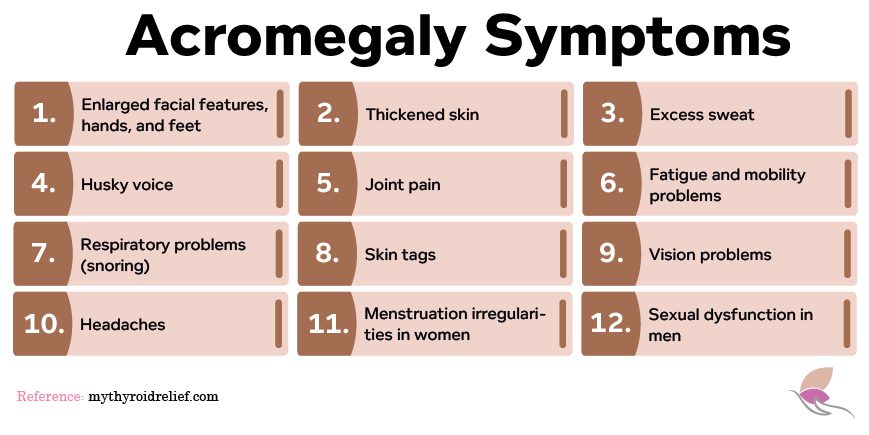
Luteinizing Hormone (LH) and Follicle Stimulating Hormone (FSH) typically present various symptoms that affect men and women differently.
In women, It results in
- Irregular or no menstruation
- Decreased libido
- Reduction in breast size
- Bone weakness and fractures
- Pain during sexual intercourse
In men, features include
- Reduced facial and body hair
- Reduced libido
- Erectile dysfunction
- Reduction in the size of genital organs
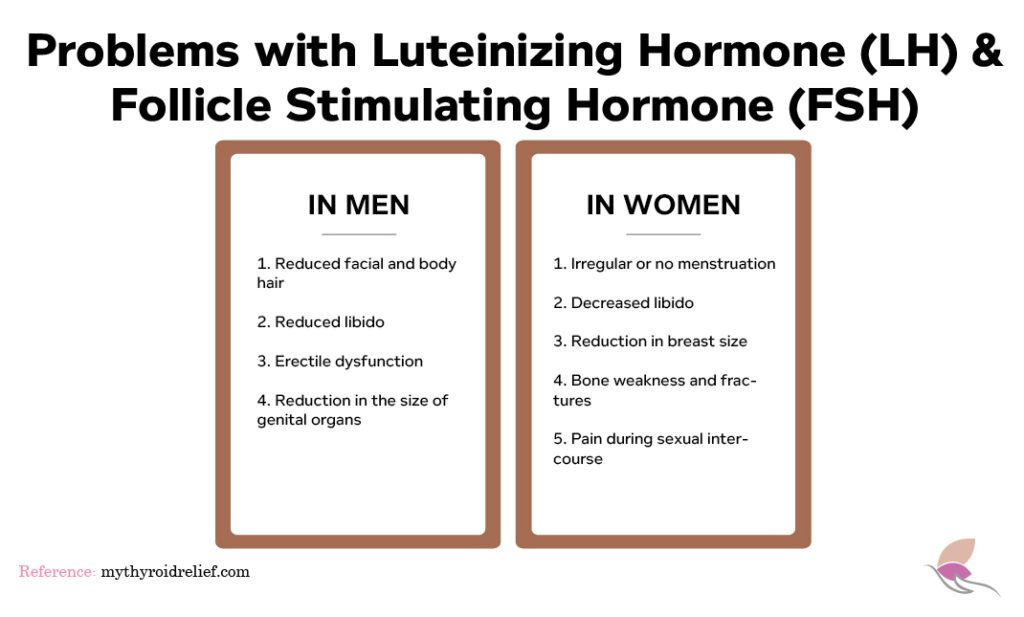
Thyroid Stimulating Hormone: Pituitary disorders usually manifest with features of hypothyroidism. They can be found here.
Adrenocorticotropic Hormone
Excess ACTH in the body manifests as:
- Weight gain
- Depressed mood
- Irregular menstruation
- Increased hair growth
- Acne
- High blood pressure
- Recurrent infections
- Easy bruising
- Purple stretch marks on the abdomen.
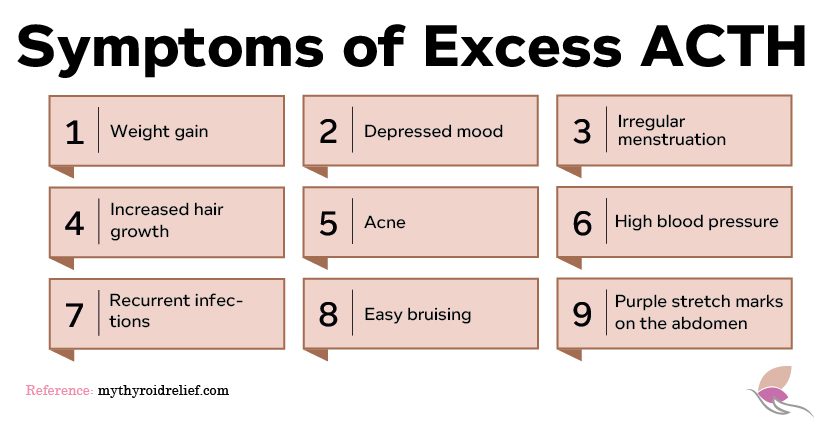
A deficiency of ACTH can cause the failure of the body to carry out normal metabolism and manage stress it can manifest with the following symptoms.
- Excessive tiredness
- Body weakness
- Anorexia, Nausea, and Vomiting
- Depressed mood or psychosis
- Dizziness and faints
- Shallow blood pressure
- Severe cases can be an emergency
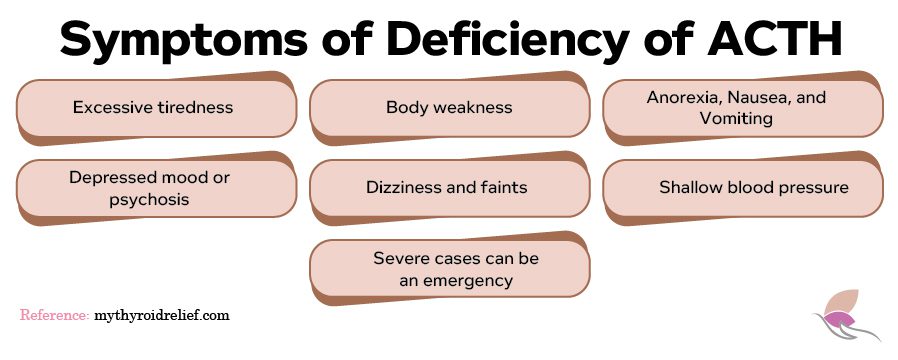
Prolactin
Hyperprolactinemia is the most common disturbance of the pituitary. Features include.
- Reduced or absent menstruation
- Reduced libido
- Dry vagina
- Milky discharge from the breast
- erectile dysfunction in men
- Reduced body hair in men
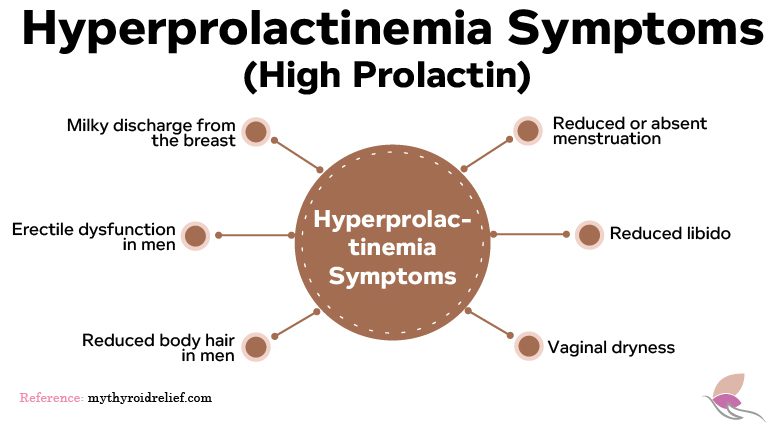
Hypoprolactinemia typically causes absent milk production in breastfeeding women. Any of these symptoms should prompt suspicion of a pituitary disorder, and you might need to see your doctor.
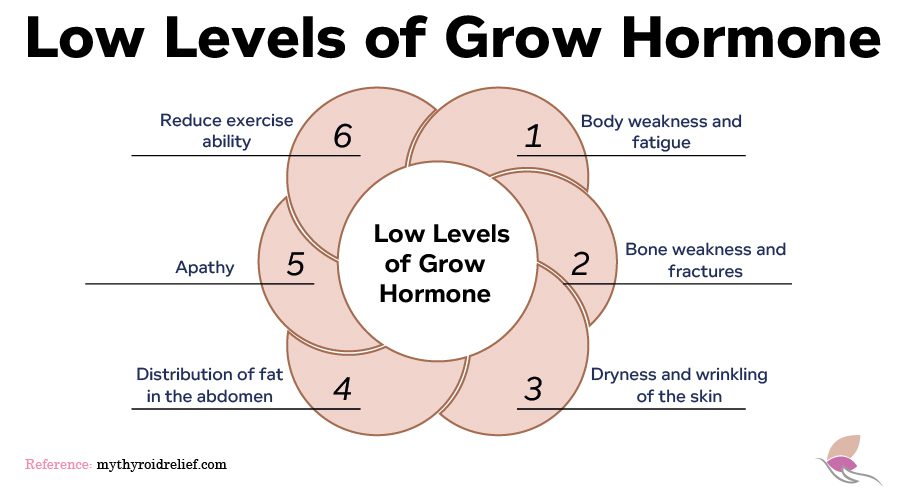
What are the risk factors for pituitary gland disorders?
The following factors increase the risk of developing pituitary gland disorders.
- Overweight and obesity
- Smoking
- Unhealthy diet
- Unhealthy lifestyle
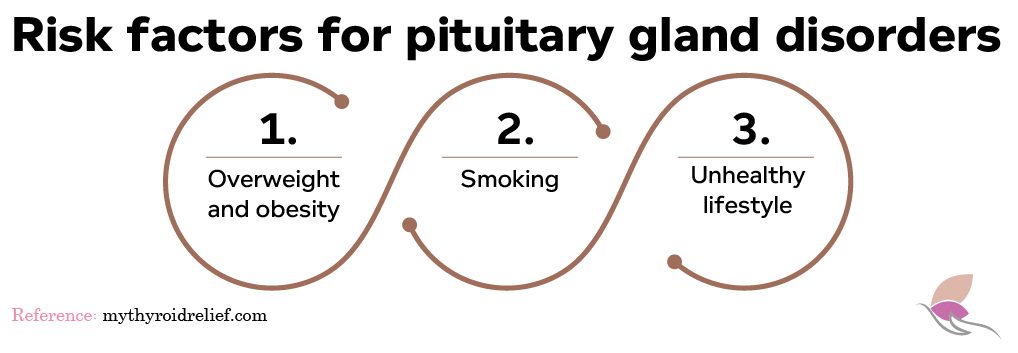
The most significant risk factor is genetic syndromes. Genetic mutations that can increase the risk of pituitary gland disorders include
- Multiple endocrine neoplasias, type IV (MEN4)
- Multiple endocrine neoplasias, type I (MEN1)
- McCune-Albright syndrome
- Carney complex
Also, note that pituitary gland disorders are not preventable. Early diagnosis and treatment make the condition manageable.
Are pituitary gland tumors heritable?
Not all pituitary gland disorders are heritable. However, studies show that genetic mutations play a significant role in developing pituitary tumors.
An example of a heritable pituitary tumor that runs in the family is the familial isolated pituitary adenoma (FIPA).
FIPA is a non-cancerous tumor found in the pituitary gland. There are different forms of FIPA; the most common conditions are prolactinomas and somatotropinoma. Prolactinoma increases the production of prolactin in the body. Although it is more prevalent in women, men can also inherit this disorder.
Somatotropinoma increases the production of growth hormones. In children, it causes gigantism, and in adults, Acromegaly.
Other less common types of familial isolated pituitary adenomas are somatolactotropinomas, thyrotropinoma, gonadotropins, ACTH-secreting tumors, and non-functioning pituitary adenomas.
In some cases, only one form of FIPA runs in the family. Sometimes, different forms of FIPA are in the family history.
What are the complications of pituitary tumors?
The pituitary tumors are slowly growing, at about 1-3mm/year. They have no effect outside the brain except in extreme cases. The appearance of pituitary tumors has effects on vision. However, it can cause partial or complete vision loss due to the tumor compressing the optic nerve and other structures. The pituitary tumors are slowly growing, at about 1-3mm/year. And have no effect outside the brain except in extreme cases. The appearance of pituitary tumors has effects on vision and can cause partial or complete vision loss due to the tumor compressing the optic nerve and other structures.
The presence of pituitary tumors could cause either excess production or deficiency of hormones.
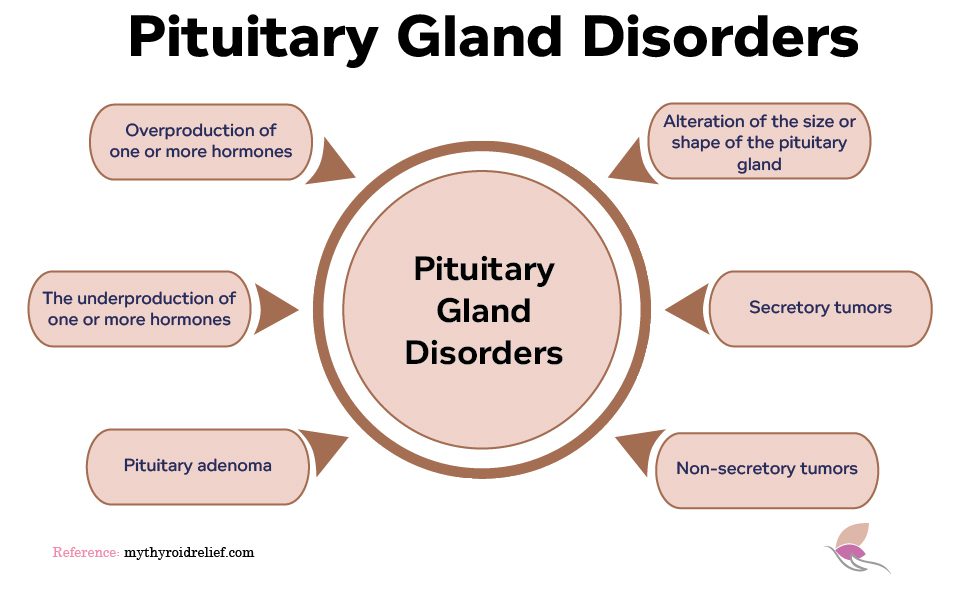
What are treatments for pituitary gland disorders?
Various treatments for pituitary gland disorders are available. However, it depends on the type and level of the conditions. Additionally, there is no cure for pituitary gland disorders, so treatment can be lifelong or short-term.
Moreover, the treatments for pituitary gland disorders are particular because the cause is different for everybody. Your health management team can provide the best treatment option for you. Some available treatments are
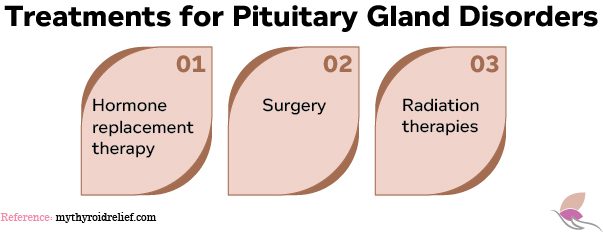
1. Hormone Replacement Therapy
Hormone replacement therapy works to restore deficient hormones to normal levels. This treatment is necessary for patients with low pituitary hormones. They function at the level of target organs under the control of the pituitary gland, such as the thyroid, adrenals, and sex glands.
One potent hormone replacement therapy is the bioidentical hormones, which are hormones made from plants such as yam and soy. These hormones prevent the cardiovascular and other side effects common with synthetics. Hormone replacement therapy benefits premenopausal women who experience reproductive dysfunction due to low pituitary hormone levels.
2. Surgery
This treatment option is best for pituitary adenoma. Surgeons can do surgery to remove tumors, especially when the tumors press against the optic nerve to impair vision.
3. Radiation therapies
In some cases, radiation therapy is better than surgery to remove pituitary adenoma. Suppose the tumor returns after surgery; radiation therapy is the following action. There are various radiation therapies; some include external radiation, proton radiotherapy, and intensity-modulated radiation therapy.
In addition, it is advisable to discuss your options with your oncologist.
4. Medications
Doctors can give some medications to either regulate excess hormone production or to increase hormone production.
Some of the medications used in drug therapies are
- Somatostatin analogs, such as Lanreotide and Octreotide, treat pituitary tumors.
- Ketoconazole reduces the secretion of cortisol. However, it does not affect the adenoma’s size or stop hormone secretion.
- Bromocriptine and Cabergoline are used to treat prolactinomas by reducing prolactin secretion and also shrinking the tumor.
However, some side effects arise from these medications. They include; nausea, dizziness, gastrointestinal disorders, and headaches. If your symptoms persist, you should contact your physician.
5. Pituitary gland transplant
This treatment is for extreme cases. It is the best treatment for end-stage failure. However, transplantation has limitations, such as graft failure or rejection, histocompatibility, and immunosuppressants.
6. Close monitoring
If you are in any form of treatment, it is essential that your physician closely monitors your development. Regular checkups with your physician are necessary.
Remember, it is essential to consult extensively with your doctor for the best and safe option for you before you decide on any treatment option.
Moreover, it is crucial to test for pituitary gland disorders if you express symptoms such as headaches, vision loss, low sex drive, muscle wasting, dizziness, and nausea. The first thing your physician has to do is check your family history for risk factors. There is a possibility that you have an inheritable genetic syndrome.
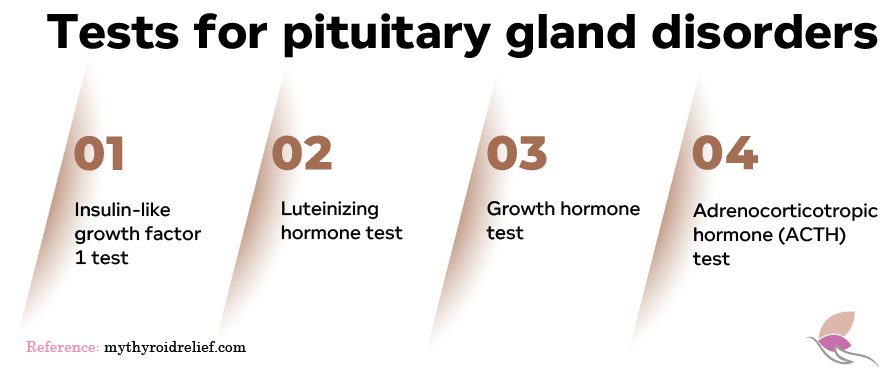
Furthermore, tumors like prolactinoma can cause a decrease in sex hormones. The following tumors have markers in the blood and urine; the presence of these tumors causes an abnormal increase in hormonal levels.”
The following hormone tests are diagnostic tools for pituitary gland disorders.
- Insulin-like growth factor 1 test. This tests for growth hormone secretion.
- Luteinizing hormone test
- Growth hormone test
- Adrenocorticotropic hormone (ACTH) test
For further examination of tumors, imaging tests will be necessary. Examples of imaging tests include
- Magnetic resonance imaging (MRI) scan
A magnetic resonance imaging scan uses radio waves and strong magnets to create detailed images of the body’s internals. MRI scans are essential for looking at the brain and spinal cord; therefore, they provide clear images of pituitary adenoma.
- Computed tomography (CT) scan
CT scans give cross-sectional images of the body’s internals. CT scans are not detailed as MRI scans but reveal pituitary adenomas if they are large enough.
Another vital diagnostic is a biopsy. It involves removing a tumor section for further examination in the laboratory. A biopsy is necessary to find the exact tissues of the tumor and find an effective treatment for the diagnosis.
Other tests are a test for diabetes insipidus and venous blood sampling.
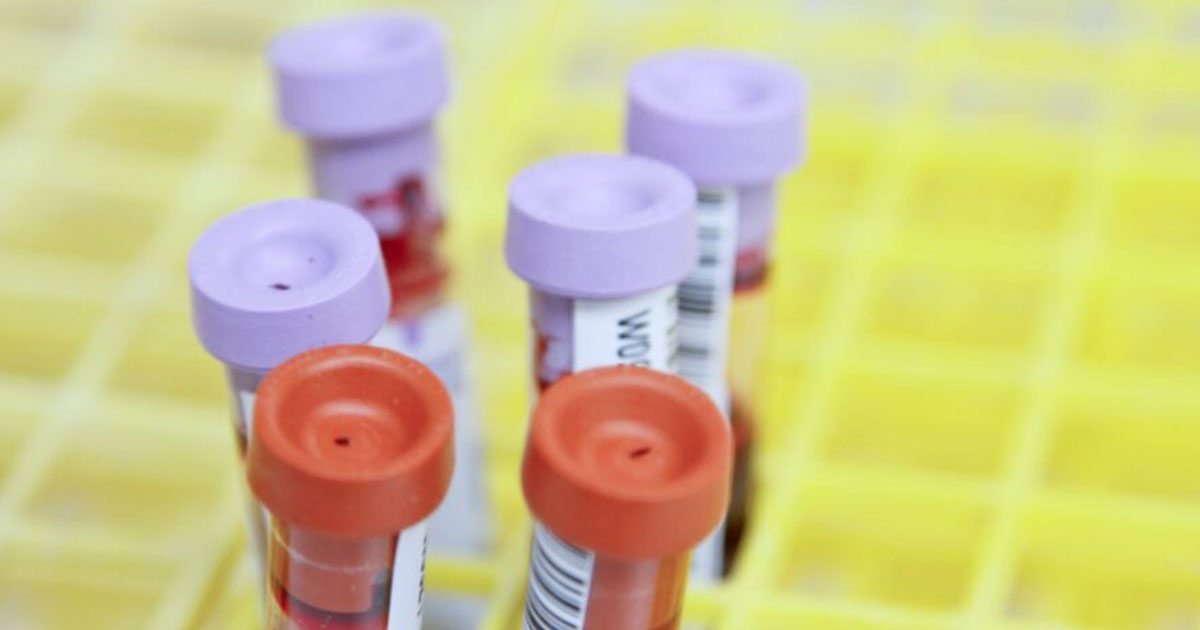
How can you improve the functioning of the pituitary gland?
Balanced diets and healthy lifestyles are essential for adequate maintenance of the body. You do not have to wait for problems with your organs before taking care of your health. It would help if you had foods, vitamins, and minerals that improve the functioning of the pituitary gland. There are some adjustments you can make to your diet to ensure that you have a healthy body system.
The pituitary gland is essential for maintaining growth. Nutritionists recommend the intake of Vitamin D and E, magnesium, and manganese in your diet to improve pituitary health. Foods that contain these vitamins and minerals are high-protein foods, such as meat, fish, food, and nuts. Green leafy vegetables, wheat, and legumes are necessary for pituitary health. Other essential minerals are iron and iodine.
For low growth hormone production in old age, CDP-choline, arginine, ornithine, glycine, glutamine, and niacin (Vit B3) can help support endogenous growth hormone secretion.
However, it is essential to note that one must take vitamins and minerals under your doctor’s supervision. Furthermore, healthy lifestyle tips are essential:
- Drink water regularly
- Avoid sugary and junk foods with pesticides and preservatives.
- Avoid excess intake of salt and sodium.
- Choose whole grains over refined foods, organic, grass-fed meats, and wild seafood.
- Exercise daily
- Manage the stress with relaxation techniques and alternative therapies
Conclusion
For the effective management of pituitary gland disorders, early diagnosis is critical. Pituitary gland disorders are not preventable, but you can reduce the risks of a severe disease once you start experiencing some symptoms. However, it is crucial to consult a doctor immediately so you can start the appropriate treatments. Moreover, the pituitary gland secretes thyrotropin, which plays a vital role in thyroid health. For proper thyroid functioning, the pituitary gland must produce and secrete thyrotropin adequately to regulate thyroid activity. For proper thyroid functioning, the pituitary gland must produce and secrete thyrotropin adequately to regulate thyroid activity.
Furthermore, genes play a significant role in pituitary gland disorders. If you have a family history of pituitary tumors, it is imperative to test for pituitary hormone function. Early testing reduces the chances of late-stage medical intervention. It can take a significant toll on your mental health. Also, it is crucial to manage your stress with alternative therapies and techniques of relaxation.
The pituitary gland is a tiny organ but is crucial in maintaining the quality of life. It is the control house for several hormones in the body. It would help if you took extra care of your health. Exercising regularly and eating a balanced diet rich in organic vegetables, fruits, and lean grass-fed meats can help. Also, it is crucial to managing your stress. And avoid exposure to environmental toxic chemicals and heavy metals from hygienic and beauty products, foods, and water to keep the health of your pituitary gland.